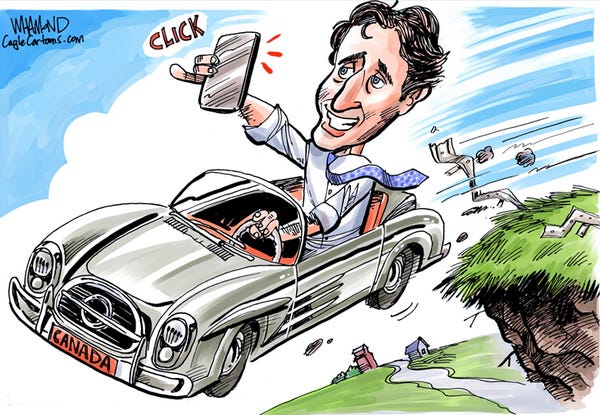Why did Trudeau Revoke the Emergencies Act?
Did this seemingly sudden about-face have something to do with the WEF?
Wednesday night, Justin Trudeau held a press conference to announce the revocation of Canada’s Emergencies Act, formerly known as the War Measures Act, which he had originally invoked on Monday, 14th February. The timing of this was curiously, right before the vote in the Senate.
Trudeau revokes the Emergencies Act
via True North, 23 February 2022:
Prime Minister Justin Trudeau announced Wednesday that his government would be revoking his implementation of the Emergencies Act.
“The situation is no longer an emergency. Therefore, the federal government will be ending the use of the Emergencies Act,” said Trudeau.
“We are confident that existing laws and by-laws will be sufficient to keep people safe.”
Trudeau argued that giving his government sweeping powers was “the response and necessary thing to do,” in response to the freedom convoy.
A joint committee of parliamentarians will now review the government’s decision to declare a national emergency within 60 days, as required by the legislation.
Trudeau’s revocation of the Emergencies Act comes days after the House of Commons approved the use of the unprecedented law – thanks to the parliamentary support of Jaghmeet Singh and the New Democratic Party [NDP].
Trudeau appeared very smug and pleased with himself after the Parliamentary vote this past Monday night which resulted in 185 MPs voting in support of the Emergency Motion versus 151 opposing it. This meant that the strict measures would continue unabated for at least another 30 days.
The question is, what exactly had transpired behind the scenes for Trudeau’s revocation to occur so seemingly suddenly?
This is the short video of Trudeau reading his scripted announcement last night:
We were very clear that the use of the emergencies act would be limited in time and today, after careful consideration we're ready to confirm that the situation is no longer an emergency. Therefore the federal government will be ending the use of the Emergencies Act.
We are confident that existing laws and bylaws are now sufficient to keep people safe. A joint committee of Parliamentarians will be struck to review the Declaration of Emergency.
Within 60 days there will be an Inquiry into the circumstances that led to the Emergencies Act being invoked. It will look at how we got there and why it was required. It could look at policing. The Inquiry could also examine the funding influence and disinformation that supported the illegal blockades and occupations, both foreign and domestic.
Going forward it'll be important that we gain a fuller understanding of what gave rise to this kind of disregard for laws and threat to our democracy. We need to make sure our institutions are prepared and ready in the future.
While the immediate emergency situation is over, this issue won't just go away.
Below is the recording of the full press conference Trudeau gave Wednesday, 23rd February. The following cohorts of Trudeau were present:
Deputy Prime Minister and Minister of Finance, Chrystia Freeland;
President of the Queen’s Privy Council for Canada and Minister of Emergency Preparedness, Bill Blair (N.B. Blair was the Toronto Police Chief during the kettling and tear gassing of innocent protestors at the 2010 G20 in Toronto);
Minister of Justice and Attorney General of Canada, David Lametti; and
Trudeau began the press conference by saying the following.
As a result of dangerous and unlawful activities in our capital city and at many border crossings across the country the Federal Government invoked the emergencies act. It was the responsible and necessary thing to do.
We did it with three principles top of mind.
First, restoring peace and order.
Second, doing it the right way.
And third, making sure that it was time limited.
The first point, restoring peace and order in our streets and restoring confidence in our institutions was top of mind. Public safety as well as jobs and the economy were at risk.
People were being harassed, small businesses were closing, factories were shutting down and trade was halted at our borders.
Here in Ottawa and in other places in the country there is evidence of individuals wanting to undermine and even harm Canada's democracy. Their participation was believed to increase the potential for unrest and violence.
We worked closely to support provinces and municipalities to get the situation under control, but as the weeks went by it became obvious that provincial and local authorities needed more tools in order to enforce the law and protect Canadians. And that's exactly what the Emergencies Act provided to them.
As interim Chief of Police Bell said, “The Emergencies Act was a turning point in ending the illegal occupation. Now order has been restored and the blockades and occupation are over.”
When we invoked the act we needed to make sure we did it the right way.
We'll always defend the rights of Canadians to peaceful assembly and to freedom of expression.
As I said before, the Emergencies Act was created to flow from and uphold the Canadian Charter of Rights and Freedoms. These measures had to be and were compliant with The Charter. [Premier Brian Peckford would be the first one to denounce and debunk this statement.]
Parliamentarians debated and the House voted. We followed procedure and it is critical that we continue to do so. That's why a joint committee of parliamentarians will be struck to review the Declaration of Emergency. Within 60 days there will be an inquiry into the circumstances that led to the Emergencies Act being invoked. It will look at how we got there and why it was required. It could look at policing.
The inquiry could also examine the funding, influence and disinformation that supported the illegal blockades and occupations, both foreign and domestic.
We were very clear that the use of the Emergencies Act would be limited in time. When we invoked it it would be in place for up to 30 days but we said that we would lift it as soon as possible.
We've held updates and briefs with Ministers and officials every day, often multiple times a day. And today, after careful consideration we're ready to confirm that the situation is no longer an emergency. Therefore the federal government will be ending the use of the Emergencies Act.
We are confident that existing laws and bylaws are now sufficient to keep people safe. Of course we'll continue to be there to support provincial and local authorities if and when needed.
And, I want to reassure Canadians, law enforcement agencies are prepared to deal with anyone engaging in unlawful or dangerous activities. Police officers will continue to be there to protect our streets and neighbourhoods within their jurisdictions.
It'll be important that we gain a fuller understanding of what gave rise to this kind of disregard for laws and threat to our democracy.
We need to make sure our institutions are prepared and ready in the future. While the immediate emergency situation is over, this issue won't just go away. We need to constantly work to defend and improve our democracy at home and around the world, and we have a lot of challenges ahead of us.
Let's remember that we're fighting a virus, not each other. Let’s work together.
After two difficult and painful years, we have a lot of healing to do. And now is the time to be there for one another. Merci.
Media Questions:
Q: The situation seems the same. What has changed in the past two days?
JT: Tools to deal with and this is what we gave with the various parts of the Emergencies Act. We did not want to keep this legislation. The threat, the manifestation, illegal threat of protests, for blockades existing to prevent other occupations. [Etc, etc.]
During the press conference for Trudeau’s revocation of the Emergencies Act, Deputy Prime Minister and Finance Minister, Chrystia Freeland stated the following:
“The process of unfreezing accounts has already begun as the RCMP announced. The RCMP has already asked banks to begin unfreezing bank accounts because these bank accounts were frozen to convince people who took part in the occupations and the illegal blockades to listen to reason [!!!]. As the Prime Minister said, after the Governor General signs the Revocation of the Emergencies Act, the situation will end.
”I’d just like to address that there are bank accounts that will remain frozen but not because of the Emergency Measures. There will be other court orders, and because of these court orders, the bank accounts will stay frozen.”
Seemingly just like that, they’ve revoked the Emergencies Act and they are also walking back the quite possibly unlawful freezing of bank accounts.


Might the diabolical WEF duo of Trudeau and Freeland have overstepped their remit whilst celebrating their ability to take abuse of power to dizzying new heights such that they have upset their handlers?
Mark Crispin Miller posted this interesting piece last night. It indicates that this scenario may well be the case.
Trudeau backed off so that the WEF could have the digital ID rolled out by the Canadian Banking Association
Klaus Schwab must have given him and Christia Freeland quite an earful, for their ham-fisted seizure of Canadians' assets
22 hr ago
So, just as “COVID” screeches to a halt, its globalist authors start to lure us into digital-financial serfdom, via the Canadian banking system.
But since the COVID scam is coming to an end, why exactly do we now need digital IDs? Because it’s so “convenient”? Here’s hoping Trudeau’s dictatorial overreach has heightened public wariness of this “fast, easy and secure way to bank.”
BOOM, Trudeau Reversal Motive Surfaces – Canadian Banking Association Was Approved by World Economic Forum To Lead the Digital ID Creation
February 23, 2022 | Sundance | 158 Comments
Sunlight is the best disinfectant. A promotional video from the Canadian Bankers Association (CBA) helps to neatly connect all the dots about why the Canadian government made such a quick reversal in their bank asset seizures in the last 24 hours {Go Deep}. And yes, as we suspected, it was almost certainly contact from the World Economic Forum to Canadian Finance Minister Chrystia Freeland that triggered the change in position.
When Canadian Prime Minister Justin Trudeau and Finance Minister Chrystia Freeland announced they would use the Emergency Act declaration to target the financial support systems, banks and accounts of the people who were protesting against COVID mandates, they not only undermined the integrity of the Canadian banking system – but they also inadvertently stuck a wrench into the plans of the World Economic Forum and the collaborative use of the Canadian Bankers Association to create a digital id.
Against the backdrop of the Canadian government action, WATCH THIS VIDEO:
It does appear to myself and others that the WEF’s appointment of the Canadian Banking Association to lead the global roll-out of digital ID may well have forced Trudeau to revoke the Emergencies Act.
May all that has been hidden continue to be revealed.






